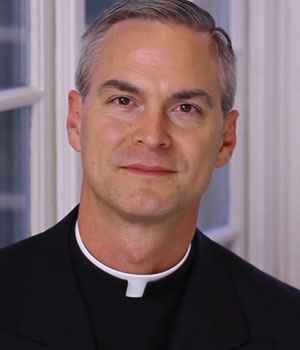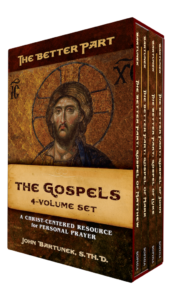Podcast: Play in new window | Download (Duration: 33:21 — 23.0MB) | Embed
Subscribe: Apple Podcasts | Spotify | Amazon Music | Android | Pandora | iHeartRadio | JioSaavn | Podchaser | Gaana | Podcast Index | Email | TuneIn | Deezer | Anghami | RSS | More

Episodio 2 – El Cielo en la Fe Día 1 Oración 2 por Santa Isabel de la Trinidad – Comenzando a orar con el Dr. Anthony Lilles – Podcast Corazones Discernientes
Este episodio con el Dr. Anthony Lillis y Kris McGregor se centra en las reflexiones espirituales de Santa Isabel de la Trinidad, concretamente en su retiro “El Cielo en la Fe” y su aplicación a la vida de oración. El debate se centra en la integración de la vida cotidiana con la oración constante, inspirada en la segunda oración del primer día del retiro. Esta oración, profundamente arraigada en los escritos de Santa Isabel, hace hincapié en la llamada a «permanecer en mí» expresada por Jesús, abogando por una morada perpetua y habitual en la presencia de Dios.
Las reflexiones de Santa Isabel, exploradas por la Dra. Lillis, subrayan la importancia de incorporar temas de meditación a lo largo del día, una práctica que se alinea con los ejercicios espirituales desarrollados por San Ignacio de Loyola. Este método de reflexión, que incluye oraciones matutinas y vespertinas seguidas de meditación, tiene como objetivo fomentar una comunión más profunda con el amor transformador de Cristo. Los escritos de Isabel sirven de guía para que su hermana y otros creyentes interioricen las enseñanzas divinas y las apliquen a sus vidas, cultivando así una conciencia continua de la presencia de Dios.
El Dr. Lillis desarrolla la profunda comprensión de Isabel del “Permanecer” en Dios, que no se limita a momentos fugaces, sino que se extiende a un estado permanente y habitual de estar con Dios en todos los aspectos de la vida. Este enfoque tiene sus raíces en las experiencias personales de Isabel de la presencia divina y su contemplación de las Escrituras, en particular su meditación sobre la simple pero profunda línea de las Escrituras, “permanece en mí”. Las enseñanzas de Elizabeth abogan por una vida en la que cada acción y relación esté impregnada de la conciencia de Dios, animando a los creyentes a mantener la alegría en Su presencia en medio de los desafíos cotidianos.
La conversación también profundiza en los fundamentos teológicos de las ideas de Isabel, destacando la inhabitación de la Trinidad y el viaje transformador que supone reconocer la propia miseria y la nada ante la misericordia de Dios. Los escritos de Isabel revelan un camino hacia la transformación espiritual a través de la aceptación de nuestras debilidades y fracasos, donde los encuentros con la misericordia de Dios conducen a una vida de amor y gracia.
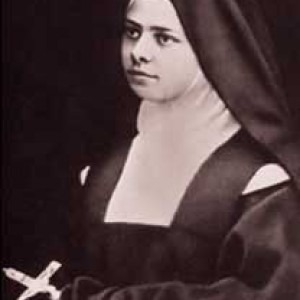
Día 2 – Segunda oración
3. “Permaneced en Mí». Es la Palabra de Dios quien da esta orden, expresa este deseo. Permaneced en Mí, no unos instantes, unas horas que deben pasar, sino «permaneced…” permanentemente, habitualmente, Permaneced en Mí, orad en Mí, adorad en Mí, amad en Mí, sufrid en Mí, trabajad y actuad en Mí. Permanece en Mí para que puedas encontrarte con cualquiera o con cualquier cosa; penetra aún más en estas profundidades. Esta es verdaderamente la «soledad a la que Dios quiere atraer el alma para hablarle», como cantaba el profeta.
4. Para comprender este dicho tan misterioso, no debemos, por así decirlo, detenernos en la superficie, sino adentrarnos cada vez más en el Ser divino por medio del recogimiento. “Sigo mi camino”, exclamó San Pablo; así debemos descender cada día por esta senda del Abismo que es Dios; deslicémonos por esta pendiente en confianza totalmente amorosa.”Abismo llama a abismo”.Es allí, en lo más profundo, donde se produce el impacto divino, donde el abismo de nuestra nada se encuentra con el Abismo de la misericordia, con la inmensidad del todo de Dios.Allí encontraremos la fuerza para morir a nosotros mismos y, perdiendo todo vestigio del yo, seremos transformados en amor. . . . “¡Bienaventurados los que mueren en el Señor!
Isabel de la Trinidad. The Complete Works of Elizabeth of the Trinity, vol. 1 (featuring a General Introduction and Major Spiritual Writings) (Obra completa de Isabel de la Trinidad) (pp. 94-95).
ICS Publications. Edición Kindle.
Discerning Hearts Reflection Questions
- Encuentro personal con la presencia de Dios: Reflexiona sobre tus propias experiencias de la presencia de Dios en tu vida.
¿Recuerdas momentos en los que te hayas sentido particularmente cerca de Dios, semejantes a las experiencias de Santa Isabel? ¿Cómo influyen esos momentos en tu deseo de “permanecer en Él” continuamente? - Integración de la oración en la vida cotidiana: Santa Isabel subraya la importancia de permanecer habitualmente en la presencia de Dios, no sólo durante los momentos formales de oración, sino a lo largo de todo el día.
Reflexiona sobre los retos y las oportunidades que se te presentan a la hora de integrar la oración y la conciencia de Dios en tus actividades cotidianas. ¿Cómo puedes hacer que cada acción y relación sea un reflejo de tu comunión orante con Dios? - Encontrar a Dios en la debilidad y la miseria: El podcast analiza el concepto de encontrar la misericordia de Dios en medio del reconocimiento de nuestra propia miseria y debilidad.
Reflexiona sobre cómo el reconocimiento de tus debilidades y fracasos puede ser un camino para experimentar más profundamente la misericordia y el amor de Dios. ¿Cómo cambia esta perspectiva tu forma de entender el crecimiento y la transformación espirituales? - Práctica del recogimiento: Santa Isabel habla del recogimiento como un volver el corazón y la mente a Dios.
Reflexiona sobre la práctica del recogimiento en tu propia vida espiritual. ¿Qué pasos prácticos puedes dar para cultivar esta disciplina, asegurándote de que tu conciencia de Dios impregna todo lo que haces? - Vivir una vida transformada por el amor: El objetivo último de las reflexiones de Santa Isabel es ser transformados en amor por la gracia de Dios.
Reflexiona sobre lo que significa para ti ser “transformado en amor”. ¿Cómo puedes vivir más plenamente esta transformación en tus relaciones, decisiones y acciones?
Nos gustaría dar las gracias a Miriam Gutiérrez por proporcionar “la voz” de Santa Isabel para esta serie.
Para ver otros episodios de la serie, visite la página Corazones Perspicaces del Dr. Anthony Lilles.
Anthony Lilles, S.T.D., ha servido a la Iglesia y ayudado en la formación del clero y los seminaristas desde 1994. Antes de llegar a San Patricio, trabajó en seminarios y casas de formación de la archidiócesis de Denver y la archidiócesis de Los Ángeles. Hijo de un granjero californiano, casado y con hijos adultos jóvenes, es licenciado en Teología por la Universidad Franciscana de Steubenville y posee tanto la licencia eclesiástica como el doctorado en Teología Espiritual por la Universidad Pontificia Santo Tomás de Aquino de Roma (el Angelicum). Experto en los escritos de Santa Isabel de la Trinidad y de los Doctores Carmelitas de la Iglesia, es cofundador del Instituto de Formación Espiritual de Ávila y del Programa de Alta Vocación para vocaciones sacerdotales. También fundó el Centro Juan Pablo II para la Cultura Contemplativa, que organiza simposios, retiros y conferencias. Además de sus publicaciones, tiene un blog en www.beginningtopray.com .

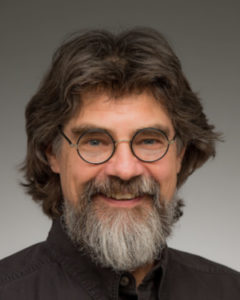





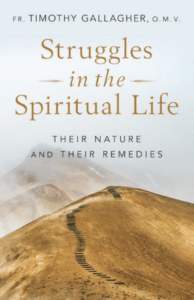
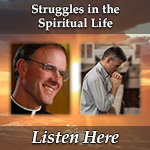


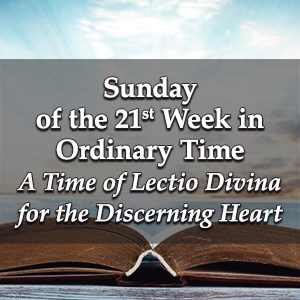 Sunday of the Twenty-First Week in Ordinary Time – A Time of Lectio Divina for the Discerning Heart Podcast
Sunday of the Twenty-First Week in Ordinary Time – A Time of Lectio Divina for the Discerning Heart Podcast
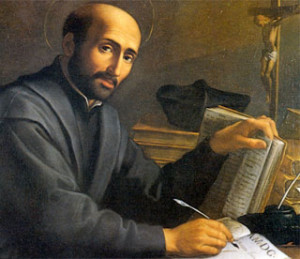
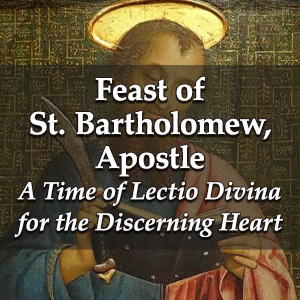 The Feast of St. Bartholomew – A Time of Lectio Divina for the Discerning Heart Podcast
The Feast of St. Bartholomew – A Time of Lectio Divina for the Discerning Heart Podcast